National Rail (NR) is the trading name licensed for use by the Rail Delivery Group, an unincorporated association whose membership consists of the passenger train operating companies (TOCs) of England, Scotland, and Wales. The TOCs run the passenger services previously provided by the British Railways Board, from 1965 using the brand name British Rail. Northern Ireland, which is bordered by the Republic of Ireland, has a different system. National Rail services share a ticketing structure and inter-availability that generally do not extend to services which were not part of British Rail.

A conductor or guard is a train crew member responsible for operational and safety duties that do not involve actual operation of the train/locomotive. The conductor title is most common in North American railway operations, but the role is common worldwide under various job titles. In Commonwealth English, a conductor is also known as guard or train manager.
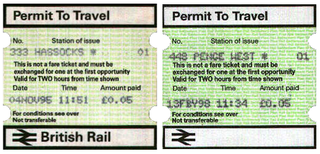
In the ticketing system of the British rail network, a Permit to Travel provisionally allows passengers to travel on a train when they have not purchased a ticket in advance and the ticket office of the station they are travelling from is closed, without incurring a penalty fare.
The Armagh rail disaster happened on 12 June 1889 near Armagh, County Armagh, in Ireland, when a crowded Sunday school excursion train had to negotiate a steep incline; the steam locomotive was unable to complete the climb and the train stalled. The train crew decided to divide the train and take forward the front portion, leaving the rear portion on the running line. The rear portion was inadequately braked and ran back down the gradient, colliding with a following train.
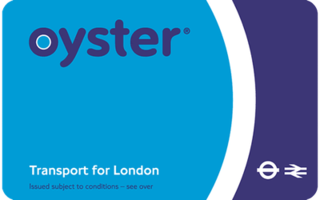
The Oyster card is a payment method for public transport in London, England, United Kingdom. A standard Oyster card is a blue credit-card-sized stored-value contactless smart card. It is promoted by Transport for London (TfL) and can be used on as part of London's integrated transport network on travel modes including London Buses, London Underground, the Docklands Light Railway (DLR), London Overground, Tramlink, some river boat services, and most National Rail services within the London fare zones. Since its introduction in June 2003, more than 86 million cards have been used.

On trains, the expression emergency brake has several meanings:
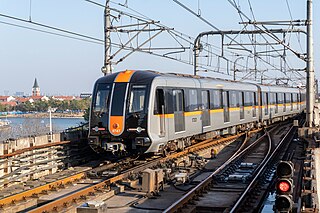
The Shanghai Metro (Chinese: 上海地铁; pinyin: Shànghǎi Dìtiě; Shanghainese: Zaon6he5 Di6thiq7) is a rapid transit system in Shanghai, operating urban and suburban transit services to 14 of its 16 municipal districts and to the neighboring township of Huaqiao, in Kunshan, Jiangsu Province.
Established in 1840, His Majesty's Railway Inspectorate (HMRI) is the organisation responsible for overseeing safety on Britain's railways and tramways. It was previously a separate non-departmental public body, but from 1990 to April 2006 it was part of the Health and Safety Executive. It was then transferred to the Office of Rail and Road and ceased to exist by that name in May 2009 when it was renamed the Safety Directorate. However, in summer 2015 its name was re-established as the safety arm of ORR.
![<span class="mw-page-title-main">Rail transport in Japan</span> Rail transport in Japan[Nippon] -Japanese Railways](https://upload.wikimedia.org/wikipedia/commons/thumb/0/0f/Railway_Route_Map_of_Japan.png/320px-Railway_Route_Map_of_Japan.png)
Rail transport in Japan is a major means of passenger transport, especially for mass and high-speed travel between major cities and for commuter transport in urban areas. It is used relatively little for freight transport, accounting for just 0.84% of goods movement. The privatised network is highly efficient, requiring few subsidies and running with extreme punctuality, though since privatisation several unprofitable but socially valuable lines have been closed by private operators.
Revenue protection inspector (RPI) or revenue protection officer (RPO) is the job title given to staff who patrol different forms of public transport issuing penalty fares to passengers who travel without a valid ticket or without the correct ticket. Bus inspectors also check whether the bus is running to time and whether the driver/conductor is collecting fares correctly, and attempt to maintain headways.
In the United Kingdom and the British Islands, any household watching or recording television transmissions at the same time they are being broadcast is required by law to hold a television licence. This applies regardless of transmission method, including terrestrial, satellite, cable, or for BBC iPlayer internet streaming. The television licence is the instrument used to raise revenue to fund the BBC and S4C.
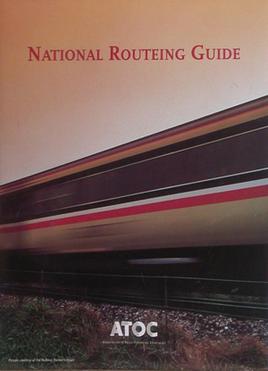
The National Routeing Guide is a document, the definitive resource on the validity of rail tickets for the purpose of rail travel in Great Britain. As stated by the Rail Regulator, "[it] sets out passengers' rights to use the network flexibly". It is a book produced by the Rail Delivery Group, which is carried by any rail ticket inspector and is also on hand for station staff.

The railway network of Great Britain is operated with the aid of a number of documents, which have been sometimes termed "technical manuals", because they are more detailed than the pocket-timetables which the public encounters every day. Historically, they were classified PRIVATE and not for publication, however since rail privatisation they are now more widely available, mostly in digital form, because they are produced centrally and not by the regional rail operators.
Fare avoidance, as distinct from fare evasion, is the lawful use of knowledge to travel using tickets which cost significantly less than the 'normal' fare for a given journey, which is what one might be expected to use. It is common in some parts of the world with complex travel networks, notably the National Rail network of Great Britain.
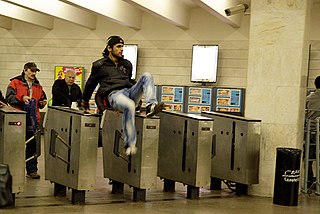
Fare evasion or fare dodging is the act of travel without payment on public transit. When considered problematic, it is mitigated by revenue protection officers and ticket barriers, staffed or automatic, are in place to ensure only those with valid tickets may access the transport. The term fare avoidance is sometimes used as a euphemistic synonym and sometimes used to refer to the lawful use of much cheaper tickets.
A penalty fare, standard fare, or fixed penalty notice is a special, usually higher, fare charged because a passenger using public transport did not comply with the normal ticket purchasing rules. It should not be confused with an unpaid fares notice.
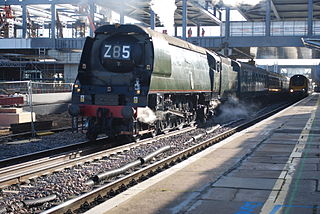
On 7 March 2015, a steam-hauled charter train passed a signal at danger and subsequently came to a stand across a high-speed mainline junction near Wootton Bassett Junction, Wiltshire, England. Another train, which had right of way, had passed through the junction 44 seconds earlier and no collision occurred nor was any damage done.
The Ballymacarrett rail crash occurred on 10 January 1945 at 7:50am in the Ballymacarrett area of Belfast, County Down, Northern Ireland on the Belfast to Bangor Line of the Belfast and County Down Railway, when a train led by a heavy autotrain driving trailer ran into the back of a stopped passenger train consisting of lightweight wooden coaches. 22 died with 27 injured. It was the worst crash in Northern Ireland since 1889. The cause was found to be carelessness of the driver of the autotrain who was running too fast for conditions. Fog, unsafe railway rules, and possible distraction from passengers all may have contributed to the accident. Old lightweight rolling stock contributed to the great number of injuries and deaths. The accident led to the demise of the railway company which was nationalised three years later.
The Railways Act, 1989 is an Act of the Parliament of India which regulates all aspects of rail transport. The Act came into force in 1989, replacing the Railways Act of 1890. The Act provides in detail the legislative provisions regarding railway zones, construction and maintenance of works, passenger and employee services.
The single justice procedure (SJP) was introduced by the Criminal Justice and Courts Act 2015 in England and Wales. Under this procedure a single magistrate, with a legally qualified adviser, can try minor non-imprisonable offences without a court hearing, unless the defendant chooses to attend a hearing in court.






![<span class="mw-page-title-main">Rail transport in Japan</span> Rail transport in Japan[Nippon] -Japanese Railways](https://upload.wikimedia.org/wikipedia/commons/thumb/0/0f/Railway_Route_Map_of_Japan.png/320px-Railway_Route_Map_of_Japan.png)


